Tuesday, October 31, 2006
More fighting words
Fresh off its look at what a "civil war" is, NPR is in the middle of a series of reports on word choice, terrorism and war. Start here with the one on "jihadist" and be sure to read the one about "Islamofascism." For another take on the latter topic, check out this post at Words at Work.
Monday, October 30, 2006
Wheel watchers
The "Wheel of Fortune" crew came through town this weekend in a contestant search. My wife and I took our 6-year-old son, who is a big "Wheel" fan, to the mall to try out. Maybe we'd be lucky.
My wife is the puzzle master in our household. Each Sunday, everyone in our house has to be quiet during the Will Shortz segment on NPR, and she needs her sudoku time. And she's great at "Wheel." Vowels? She doesn't need to buy any stinkin' vowels. She'd be a great contestant on the show.
I'm OK at such things, but not stellar. So naturally, I was the one who ended up on the "Wheel" stage Sunday. Here's how the game works when it goes on the road:
I got lucky again. When the fake Sajak asked me what I did for a living, I replied: "I
am a journalism professor at UNC-Chapel Hill." The audience roared in approval. I roared back: "Yeah!" (The fake Sajak had been encouraging us to be as enthusiastic as possible.) For my interests, I told our host that I liked playing tennis with my son and listening to '80s music. I got lucky one more time: The fake Sajak didn't ask me to sing or dance, as he had done with other contestants. My performance of "Careless Whisper" may have turned the audience against me, after all.
The game itself took less time than the interviews. I only got to call one letter (T), and I didn't win the puzzle. My luck had run out. The answer, by the way, was Research Triangle Park, as many of the puzzles had a local flavor.
If the "Wheel" people liked my performance, I will get a call within four weeks to return to the mall for more realistic simulation of the game, and from there, to a taping in California. It would be fun if that happened, but if not, that's fine too. It was a thrill to get a chance to play -- and to know that 500 people will cheer for an editing professor.
My wife is the puzzle master in our household. Each Sunday, everyone in our house has to be quiet during the Will Shortz segment on NPR, and she needs her sudoku time. And she's great at "Wheel." Vowels? She doesn't need to buy any stinkin' vowels. She'd be a great contestant on the show.
I'm OK at such things, but not stellar. So naturally, I was the one who ended up on the "Wheel" stage Sunday. Here's how the game works when it goes on the road:
- About 500 "Wheel" hopefuls line up in a vacant department store and fill out forms that pose the usual questions, plus one asking "what makes you interesting?"
- The forms are pulled from a bin five at time, and those five people take the stage.
- A fake Pat Sajak and fake Vanna White run the game.
- The fake Sajak asks contestants about themselves: name, occupation and what makes them interesting.
- The game begins.
- Contestants don't spin the wheel. They just call out letters, including vowels. The first contestant to get the puzzle wins, and the game is over.
- All five contestants get some swag as they step off the stage: items such as "Wheel" T-shirts and glossy photos of Sajak and White.
- Five more lucky people get their chance.
I got lucky again. When the fake Sajak asked me what I did for a living, I replied: "I
am a journalism professor at UNC-Chapel Hill." The audience roared in approval. I roared back: "Yeah!" (The fake Sajak had been encouraging us to be as enthusiastic as possible.) For my interests, I told our host that I liked playing tennis with my son and listening to '80s music. I got lucky one more time: The fake Sajak didn't ask me to sing or dance, as he had done with other contestants. My performance of "Careless Whisper" may have turned the audience against me, after all.
The game itself took less time than the interviews. I only got to call one letter (T), and I didn't win the puzzle. My luck had run out. The answer, by the way, was Research Triangle Park, as many of the puzzles had a local flavor.
If the "Wheel" people liked my performance, I will get a call within four weeks to return to the mall for more realistic simulation of the game, and from there, to a taping in California. It would be fun if that happened, but if not, that's fine too. It was a thrill to get a chance to play -- and to know that 500 people will cheer for an editing professor.
Friday, October 27, 2006
Debatable headlines
This column from the Pew Project for Excellence in Journalism poses an interesting question: Why won't newspapers say who won a debate between candidates?
Having written my share of headlines describing candidates sparring, clashing and duking it out, I understand the problem. Writing those, I wondered whether I was really telling readers anything. Most debate headlines don't offer a judgment on who won. They rarely say anything, but hey, they're fair.
In some cases, it's clear who the debate winner was. For example, John Kerry beat President Bush in their first debate in 2004. It took a few days for most of the media to say that, however. In other debates, the outcome isn't so clear, as in later debates between those two.
Regardless of winners and losers, debates rarely match the hype that they generate. Maybe we'll see this headline package someday:
SPARKS DON'T FLY
Candidates dance but land few blows; bout ruled no decision
Having written my share of headlines describing candidates sparring, clashing and duking it out, I understand the problem. Writing those, I wondered whether I was really telling readers anything. Most debate headlines don't offer a judgment on who won. They rarely say anything, but hey, they're fair.
In some cases, it's clear who the debate winner was. For example, John Kerry beat President Bush in their first debate in 2004. It took a few days for most of the media to say that, however. In other debates, the outcome isn't so clear, as in later debates between those two.
Regardless of winners and losers, debates rarely match the hype that they generate. Maybe we'll see this headline package someday:
SPARKS DON'T FLY
Candidates dance but land few blows; bout ruled no decision
Thursday, October 26, 2006
College papers collected
College Front Page is a site that is similar to the Newseum's collection of daily newspapers. The collegiate version is not updated as often, but it still shows a range of talent, skill and approaches to design and headline writing. And you can see and download not only front pages, but also sports and features.
It's also fun to read through the list of participating newspapers, many of which have unusual names. Here are some I like:
It's also fun to read through the list of participating newspapers, many of which have unusual names. Here are some I like:
- The Arbiter (Boise State)
- The Daily Barometer (Oregon State)
- The Flat Hat (William & Mary)
- The Daily Targum (Rutgers)
- The Vanderbilt Hustler
- The Gargoyle (Flagler)
- Purdue Exponent
- The Justice (Brandeis)
Wednesday, October 25, 2006
Death on wheels?
 This headline from a news aggregator (where else?) is ambiguous. Is the death penalty on tour?
This headline from a news aggregator (where else?) is ambiguous. Is the death penalty on tour?No, but Florida is executing someone named Danny Rolling. Most readers, especially outside the state, do not know his name, however, especially for headline purposes. And his last name conveys another meaning altogether, so even if it is recognized by the audience, why create confusion with this sort of headline?
More on problems with news aggregators here.
Death by subjunctive mood

The clever people at The Onion are offering this coffee mug among the Onion-related items for sale on its site. The message may be morbid, but at least it uses the subjunctive mood correctly. Here's more on verbs and moods.
Tuesday, October 24, 2006
New look in L.A.
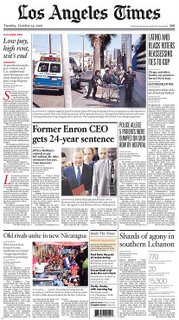
The Los Angeles Times has redesigned, bringing in all-caps headlines and other devices to the front page, among other changes. It seems pretty tame as these things go.
Still, some readers don't like the new look and reorganization. Their comments include the inevitable comparisons to USA Today. That always seems to happen when any newspaper has a redesign, doesn't it?
The evolving language of war
The word choices regarding the Iraq war are fascinating. Here are the latest developments:
- The White House is turning away from "stay the course" as its mantra. The Washington Post takes a deeper look in this analysis.
- NPR examines whether Iraq is in a civil war, and if so, what that means. Listen here.
Monday, October 23, 2006
Sunday night football
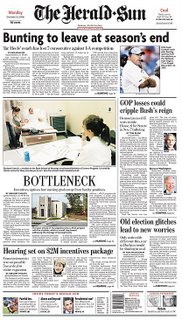 John Bunting is on the way out as football coach of the North Carolina Tar Heels. The news itself wasn't surprising, but the timing of the announcement was: 8:45 p.m. Sunday. That required hustle by reporters, editors and page designers on a night that is often quiet.
John Bunting is on the way out as football coach of the North Carolina Tar Heels. The news itself wasn't surprising, but the timing of the announcement was: 8:45 p.m. Sunday. That required hustle by reporters, editors and page designers on a night that is often quiet.It also gave a chance for print media to break a story, which doesn't happen that often these days. About two-thirds of the students in my editing class said they got the Bunting news this morning from the campus paper, not from the Web or ESPN.
Here's how notable papers in the state played the story:
1A story: The News & Observer, The Herald-Sun, the Winston-Salem Journal, The Daily Tar Heel.
1A promo: The Charlotte Observer, the News & Record
Sample headline: BUNTING BAGGED (Daily Tar Heel)
UPDATE: Here's the inside story on how the N&O dealt with the late-breaking news. Planning and teamwork were key — just like in football.
ANOTHER UPDATE: Melanie Sill, executive editor at the N&O, defends the front-page play for the story in response to comments such as these.
Sunday, October 22, 2006
Apostrophe's where they shouldn't be
 The its/it's mistakes affect us all, from the "Mom and Pop" dry cleaners to the big-box retailer. Mom and Pop also have trouble with "we are" as a contraction, and they don't get to Starbucks often. The purveyor of the hazelnut latte does not have an apostrophe in its name.
The its/it's mistakes affect us all, from the "Mom and Pop" dry cleaners to the big-box retailer. Mom and Pop also have trouble with "we are" as a contraction, and they don't get to Starbucks often. The purveyor of the hazelnut latte does not have an apostrophe in its name.
Friday, October 20, 2006
When words and images collide
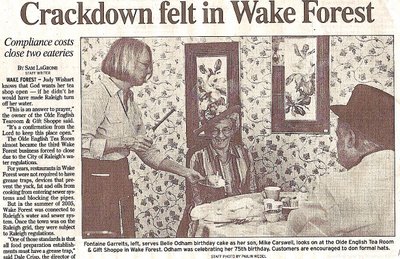 Photos and stories need to complement each other. That's sounds simple enough, but it doesn't always happen in print or online.
Photos and stories need to complement each other. That's sounds simple enough, but it doesn't always happen in print or online.This example from the North Raleigh News illustrates how this can go wrong. The story is about regulations that require restaurants that get hooked up to city water to get grease traps. Those that fail to comply are subject to the "crackdown" mentioned in the headline. (That word choice isn't the best, and "costs" in the drophead is mildly confusing because it can be read as either a noun or verb.)
The photo is from a restaurant that had to deal with the regulations, and it shows a birthday celebration. Its festive tone is a mismatch with the story's content, and it clashes with the headline. The drophead implies that the restaurant in the photo is one of the ones that's been shut down. The photo doesn't connect the reader to the central message of the story: Some restaurants are having a hard time complying with these regulations.
So what to do? Here are some options:
- Ask the photo desk for another photo.
- Bust the photo.
- Write the cutline to tie the package together. This can feel contrived, but at least give it a try.
- Rewrite the headlines to better link the image to the story.
Chicken Kyiv?
The State Department now prefers "Kyiv" as the spelling for the capital of Ukraine. AP, however, is sticking with "Kiev."
Read more on Ukraine/the Ukraine here.
Read more on Ukraine/the Ukraine here.
Thursday, October 19, 2006
Capital offense
This letter to the editor takes a wire story to task for failing to capitalize "Marine."
I agree with the letter writer. His reason? Respect. My reason: That's what AP says to do.
I agree with the letter writer. His reason? Respect. My reason: That's what AP says to do.
Wednesday, October 18, 2006
Charting alternative courses
 Gannett has several examples of alternative story forms (or charticles, the annoying name they go by there) available here in .pdf format. Some are more successful than others, but all are worth a look. (Thanks to Carl Schierhorn at Kent State for this link.)
Gannett has several examples of alternative story forms (or charticles, the annoying name they go by there) available here in .pdf format. Some are more successful than others, but all are worth a look. (Thanks to Carl Schierhorn at Kent State for this link.)This one on daylight-saving time, for example, wisely uses a Q&A format. The topic makes that approach a natural — especially in time-confused Indiana. But this page also shows what happens when there's no intro text, making it unclear where this starts and ends. Which question do you read first? Better design and use of photos could help too — this is where collaboration between editors and designers is important.
UPDATE: Read what some students think about these forms here.
One view on journalism's future
This essay from the Asheville Citizen-Times includes this observation:
Online, readers can respond right away to any story or opinion, critiquing, disagreeing or providing additional information. And the responses are relatively unfiltered. No one edits them for style or grammar or spelling.
Monday, October 16, 2006
Arianna Drudge?
 In a surprising melding of the minds, the Drudge Report and the Huffington Post had the same lead story Monday afternoon — and the same headline. At least they didn't go with the same photo, with HuffPo using what appear to be multiple images of Dennis Hastert and Drudge opting for a Nancy Pelosi picture.
In a surprising melding of the minds, the Drudge Report and the Huffington Post had the same lead story Monday afternoon — and the same headline. At least they didn't go with the same photo, with HuffPo using what appear to be multiple images of Dennis Hastert and Drudge opting for a Nancy Pelosi picture.Are Matt Drudge and Arianna Huffington more similar than we thought? And why are they starting the countdown to the election at 22?
Should we sanction this?
 "Sanction" is an odd word. As a verb, it means to approve, permit or authorize. As a noun (usually as a plural), it means measures used to punish a country, a university's athletic program or an organization.
"Sanction" is an odd word. As a verb, it means to approve, permit or authorize. As a noun (usually as a plural), it means measures used to punish a country, a university's athletic program or an organization.This headline from the News & Record in Greensboro, N.C., and another in the sports section of The News & Observer ("NCAA sanctions Kansas") blur this distinction. Yes, some dictionaries allow "sanction" to be used as a verb to mean "to impose sanctions," but the word loses its other definition if we allow that.
Or is this a losing battle?
Doggone headlines
Sonny Perdue, the governor of Georgia, isn't happy with the Atlanta Journal-Constitution. His complaint focuses on a headline from the recent Georgia-Tennessee football game, which read:
Dogs get put in their place
Even Bulldog fans admit that the headline made sense given the 51-33 score. The governor, however, took the time to write a letter to the AJC complaining of the paper's "poison pens." (Unfortunately, the letter and the response from the AJC's public editor are behind the barriers of required registration.)
There's no word yet on the governor's reaction to headlines from Georgia's most recent loss, this time to Vanderbilt.
Dogs get put in their place
Even Bulldog fans admit that the headline made sense given the 51-33 score. The governor, however, took the time to write a letter to the AJC complaining of the paper's "poison pens." (Unfortunately, the letter and the response from the AJC's public editor are behind the barriers of required registration.)
There's no word yet on the governor's reaction to headlines from Georgia's most recent loss, this time to Vanderbilt.
Saturday, October 14, 2006
Putting the brakes on 'Drive-by media'
The bitterness over coverage of the Duke lacrosse case continues. A recent comment on a News & Observer blog suggested that "you people in the DriveBy Media" cover a visit by a Brooklyn College professor who has an interest in the case.
The comment illustrates the abuse of the term "drive-by media." It's frequently used by critics of the press such as radio personality Rush Limbaugh. Here is how he defined these members of the media:
Regardless of the usefulness of the term, the comment on the N&O blog gets it backward: Say what you will about the coverage of the lacrosse case by the N&O and the rival Herald-Sun, but they aren't driving by. They live here. They aren't going anywhere. A professor from hundreds of miles away is more likely to be the one to come to town, raise a ruckus and then leave, unnoticed in the excitement.
The comment illustrates the abuse of the term "drive-by media." It's frequently used by critics of the press such as radio personality Rush Limbaugh. Here is how he defined these members of the media:
They are exactly like drive-by shooters. They pull up to a congested area; they spray a hail of bullets into the crowd. It causes mass hysteria, confusion, mistakes and misinterpretation. sometimes people and their careers actually die, and then the drive-by media smirks and they ride away, unnoticed in the excitement.Without a doubt, some reporters (usually from broadcast, not print) make careers out of "parachuting in" to cover a hot topic and then scamper away when things cool off. Greta Van Susteren, Rita Cosby and Geraldo Rivera are members of this crowd. To equate their work to the random violence of a drive-by shooting doesn't really work as a metaphor, however. And it certainly shouldn't be used as a catch-all insult for coverage you don't like.
Regardless of the usefulness of the term, the comment on the N&O blog gets it backward: Say what you will about the coverage of the lacrosse case by the N&O and the rival Herald-Sun, but they aren't driving by. They live here. They aren't going anywhere. A professor from hundreds of miles away is more likely to be the one to come to town, raise a ruckus and then leave, unnoticed in the excitement.
Unacceptable
That's the word President Bush is using a lot lately. This article in The Washington Post offers several examples and attempts to explain the president's word choice.
Thursday, October 12, 2006
Mitch Albom still doesn't get it
In this recent interview with Entertainment Weekly, sportswriter and author Mitch Albom continues his dismissive attitude toward his ethical lapse last year.
In case you missed it, Albom wrote a column for Sunday publication a few days in advance, and in it, he said that former Michigan State players "sat in the stands" at a basketball game, among other events that didn't happen. The problem: Those players told Albom that they had planned to be at the game, but they never showed up. The basis of the column was misleading.
Asked about this in the EW interview, here's what Albom says:
At the time, many copy editors edited Albom's column (which was picked up on the wire) and didn't address the problem, but one did. Read that story here.
In case you missed it, Albom wrote a column for Sunday publication a few days in advance, and in it, he said that former Michigan State players "sat in the stands" at a basketball game, among other events that didn't happen. The problem: Those players told Albom that they had planned to be at the game, but they never showed up. The basis of the column was misleading.
Asked about this in the EW interview, here's what Albom says:
It was just careless. It was just rushed. But that's all it was. It was just a rush. These guys swore to me that they were gonna be there, and so I said, Well, they're gonna be there, so we'll just write that they were there. You shouldn't do that, you should just write [that] they planned to be there. That's all. It was just missing a word.It's more than a missing word. It's a decision to write about an event before it happens and describe what happened there as if you were there as a witness. It's a decision to use an event to illustrate a theme for a column, but the event never happened. It's deceptive perhaps not on the level of Jayson Blair and Stephen Glass, but it's still wrong. And Albom is wrong to brush it off this way.
At the time, many copy editors edited Albom's column (which was picked up on the wire) and didn't address the problem, but one did. Read that story here.
Wednesday, October 11, 2006
HuffPo fumbles

The Huffington Post is at it again. As noted here and here, the site plays it fast and loose when it comes to use of file photos, sometimes creating false impressions.
This time, HuffPo includes an image of quarterback Brett Favre in a link to a story about a political candidate's sexual past with members of the Green Bay Packers. Favre, however, is never mentioned in that story. The candidate says she had encounters with the Packers of the 1960s, not the team of today.
Yet the way this is presented on the site leads one to think otherwise. Brett Favre should be peeved. And HuffPo should get a new photo editor.
A matter of public concern
Ballots in a Michigan county have to be reprinted at a cost of $40,000. The problem? The dreaded pubic/public typo. D'oh!
Tuesday, October 10, 2006
Just Another Night on the Desk
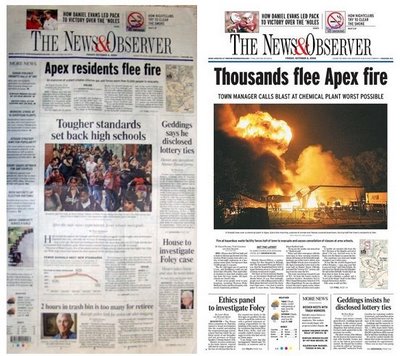 Copy editors and designers are known for working in anonymity. Even when they hustle on a big story, they get little notice.
Copy editors and designers are known for working in anonymity. Even when they hustle on a big story, they get little notice.These two front pages from The News & Observer on Friday reflect that. Late Thursday, explosions at a hazardous waste plant in Apex, N.C., forced thousands of people to evacuate. The story happened late enough in the news cycle that it updated significantly between editions.
The N&O publishes four editions each night, with each version of the paper going to a different part of the circulation area. Each successive edition has a later deadline. Generally speaking, that means readers on the Outer Banks get the early edition while people in Raleigh get the latest. On most days, the differences on the front page are so small that only the most sharp-eyed reader would notice. The differences are usually more apparent in sections of local news and in sports.
In this example, however, the front-page changes between editions are dramatic: The fire story goes from the top of the page with a map to top half with a six-column photo. Other stories go to the bottom of the page or into another section. The news summary disappears. All of this means hard work in a hurry for designers and copy editors as well as reporters, graphics artists and photographers.
Of course, most readers never knew the difference unless they happened to buy the paper in Chapel Hill and Raleigh on the same day. Yet for the desk, it's all in a night's work.
UPDATE: Ted Vaden, the public editor at the N&O, writes about the coverage of the fire in this column.
Monday, October 09, 2006
A test of news judgment
 The Newseum's collection of front pages is always worth a look, especially when a big news event happens such as a nuclear test in North Korea. Many of the front-page treatments were similar, with most of the big dailies in North Carolina and elsewhere making that story the lead, some with all-caps headlines.
The Newseum's collection of front pages is always worth a look, especially when a big news event happens such as a nuclear test in North Korea. Many of the front-page treatments were similar, with most of the big dailies in North Carolina and elsewhere making that story the lead, some with all-caps headlines.The New York tabloids, of course, exist in their own universe. So the Daily News front page on the demise of the 2006 Yankees is not a surprise. The "Kook With Nuke" headline in the promo to the North Korea story is also expected.
What is a surprise is the Tampa Tribune's "story free" front page: an alternative story form on the Bucs game and nearly 10 promos to stories inside — none to the North Korea story. Sure, football is king in Florida, and there had been rumblings for days that a nuclear test was imminent. It wasn't a total shocker. But this was still breaking news and an important story regardless of whether it was foreshadowed.
The days of the "dull but important" lead may be behind us, but is this going too far?
Colbert on language
New York magazine has a lengthy profile of Stephen Colbert in the latest issue. The Comedy Central star makes this interesting observation about word choices and politics:
Language has always been important in politics, but language is incredibly important to the present political struggle. Because if you can establish an atmosphere in which information doesn’t mean anything, then there is no objective reality.That allows Colbert, the persona, to come up with demented logic like this:
Don’t pay attention to the approval ratings that say 68 percent of Americans disapprove of the job [Bush] is doing. I ask you this: Does that not also logically mean that 68 percent of Americans approve of the job he’s not doing?
Friday, October 06, 2006
File under 'Typo'
 The Huffington Post continues its struggles with the use of file photos. To illustrate a story about Ms. magazine, the site has picked a cover from a 1996 issue with an infamous typo — misspelling "feminism." It's an unfortunate choice, assuming that Arianna Huffington is sympathetic to the cause.
The Huffington Post continues its struggles with the use of file photos. To illustrate a story about Ms. magazine, the site has picked a cover from a 1996 issue with an infamous typo — misspelling "feminism." It's an unfortunate choice, assuming that Arianna Huffington is sympathetic to the cause.Here is a better view of that cover and some speculation about how the mistake happened, and here is an example of HuffPo's previous misadventures in file imagery.
Thursday, October 05, 2006
Comma code?
When is a comma just a comma, and when is it something else? This story in the Washington Post tries to decipher what President Bush meant when he said this in a recent interview:
I like to tell people when the final history is written on Iraq, it will look like just a comma because there is — my point is, there's a strong will for democracy.
Wednesday, October 04, 2006
R.W. Apple dies
R.W. Apple, famed reporter and editor at The New York Times, has died at age 71. This obit at the NYT site notes that Apple was on occasion "cruelly short-tempered with hotel clerks, copy editors and political aides."
UPDATE: The Times has published Apple's final story, a list of his favorite restaurants worldwide. The use of the word "gourmand" in the headline is appropriate.
ANOTHER UPDATE: The headline on the story now reads "gourmet" instead. Both words fit Apple, but I like it the first way better.
UPDATE: The Times has published Apple's final story, a list of his favorite restaurants worldwide. The use of the word "gourmand" in the headline is appropriate.
ANOTHER UPDATE: The headline on the story now reads "gourmet" instead. Both words fit Apple, but I like it the first way better.
A serving of CNN.com with Onion
CNN's site has added stories from The Onion. Despite the clear "satire" label in the headline, the disclaimer at the top of the story and the Onion watermark behind the text, it's only a matter of time before someone gets confused and takes one of these jokes as serious news.
Tuesday, October 03, 2006
A cut above
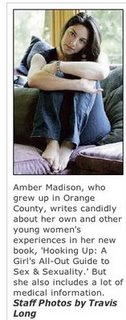 Cutlines for portraits can be difficult to write. Sometimes, the photograph accompanying a profile (like this one) is quiet and inert, yet still effective visually.
Cutlines for portraits can be difficult to write. Sometimes, the photograph accompanying a profile (like this one) is quiet and inert, yet still effective visually.That leaves cutline writers looking in vain for action. Where's the verb? It's a challenge that many of us fail to meet.
This cutline, however, gets it right. It identifies the subject, includes a local angle and describes the range of material in her book. The copy editor has used the cutline space to bring in details and lure the reader into the story.
This is much better than "Amber Madison sits in her parents' home in Orange County." We can see that.
The key is to draw material from the story to flesh out the cutline. For more tips on writing cutlines, go here.
Monday, October 02, 2006
Why we need human editors
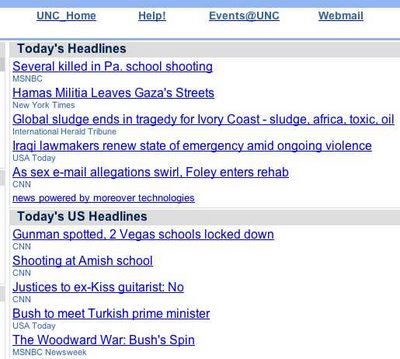 This image from the UNC-Chapel Hill site illustrates what happens when news aggregators run wild and unchecked. Here are a few troubling things about this:
This image from the UNC-Chapel Hill site illustrates what happens when news aggregators run wild and unchecked. Here are a few troubling things about this:- The headline style is inconsistent: Up or down? Pick one and stick with it.
- The story links are redundant.
- Editorials, op-eds or analysis pieces (assuming that's what the Woodward story is) are not labeled as such.
- The Kiss headline is baffling. It turns out that the story has only one paragraph about a dispute over royalties, so the headline is also a bait and switch.
- The Ivory Coast headline has an odd list at the end for no apparent reason.
- The headline on the Vegas school story needs a semicolon.
Editing editorial cartoons
 Here's something you don't see often: an apparent typo in an editorial cartoon. The artist probably meant "we're" instead of "where."
Here's something you don't see often: an apparent typo in an editorial cartoon. The artist probably meant "we're" instead of "where."